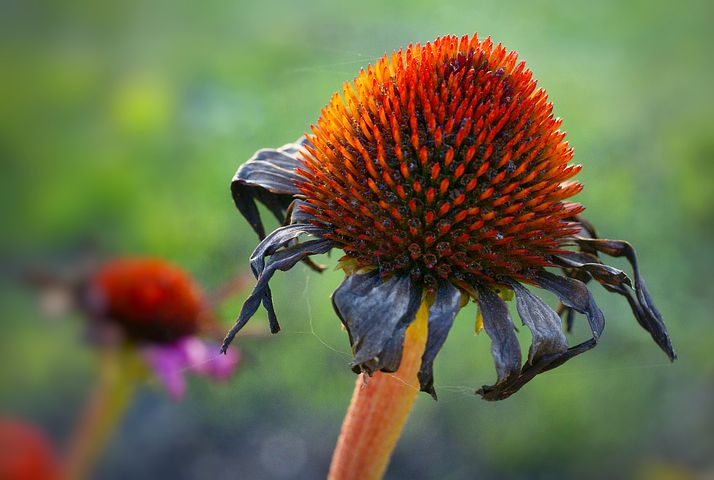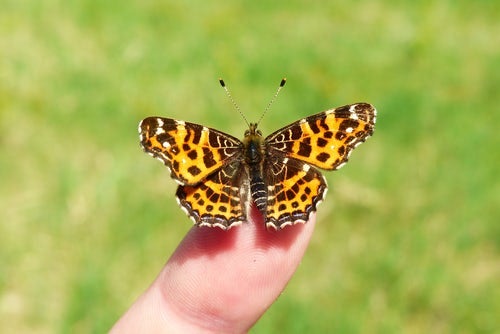2/24/2025
This will be the final issue of Mindfulness Matters. The previous issue highlighted the origin of the Mindfulness Center. As we mark this transition, this issue includes reflections from many of the teachers who have been instrumental in the Mindfulness Center’s success over the past nearly 30 years. Moving Through Endings and Beginnings (with Compassion) by Teresa Miller Last summer when I was visiting Toronto with my husband and granddaughter, we traveled around the city using the subway. At each station we were intrigued by triangle-shaped signs with three words: Mind the gap. We were to pay attention to the spatial gap at our feet between the edge of the station platform and the train doorway. Mind the gap meant slow down, take notice while crossing the open space between this and that. Mind the gap. What if we used this phrase to notice the gaps between? …between the in-breath and out-breath, between one feeling state and the next, between the ending and the beginning of particular sensations in the body, between the end of one thought and the beginning of the next one. If we examine our experience closely, we discover that we’re always in transition - at the end of one thing and before the beginning of the next - a “between” time. During every moment of our lives, something is ending, and something else is beginning. And in between is a knowable gap - between an ending and the next beginning. The between time may be large and life-changing, like the ending of a long relationship, the death of a loved one or a beloved pet or companion, the space between the end of one job and the beginning of the next one. As much as we might try to resist, endings happen in every moment—the end of a breath, the end of a day, the end of a relationship, and ultimately the end of life. And accompanying each ending is a beginning, though it may be unclear, at times eve unfathomable, what the beginning holds for us.
2/24/2025
As the Mindfulness Center moves through this period of transition from offering classes to both those in healthcare and those in the wider community to just focusing on the former, we will be devoting the next two newsletters to reflections from some of those who have been part of the Center over the almost 30 years since its founding. The Research Updates will also highlight several of the studies we have conducted. This issue’s Musing is from Allie Rudolph who co-founded the Mindfulness Center with Maria Tussi Kluge and who has been a teacher and mentor for many of us over the years. Some Reflections on the Beginnings of the UVA Mindfulness Center By Allie Rudolph I appreciate having been asked to share my reflections on how the UVA Mindfulness Center got started. My first reaction on being asked was: Wow!… I can’t believe it’s been 30 years! My second reaction was, and continues to be, an overwhelming feeling of gratitude for the group of far seeing and dedicated people who got together not only to bring mindfulness to the University of Virginia, but to the Charlottesville community at large. As the clinical social worker who joined the faculty of the then nascent Department of Family Medicine in 1980, my primary role as a faculty member teaching residents, medical students and other students rotating through the Department, was to help integrate the behavioral sciences into the curriculum of the Medical Center. I thus became more focused on bridging the gap between evidence-based science and mind/body approaches and the healing arts in general, exploring both what healing means and how to offer tools to both doctors and patients that would facilitate the healing process.
2/24/2025
Transitions can be difficult. We often want things to stay as they are, and we can find ourselves resisting change. Yet change is inevitable. Everything is impermanent, although some things change more quickly than others. Mindfulness teaches us that the only moment we can be sure about is the one that we are presently experiencing. If this moment feels pleasant we tend to want it to continue, and we may resist it changing. We can notice this resistance, and the thoughts that come up about how we want things to stay as they are, with kindness. We can then see if we can let the thoughts go and just be with whatever is arising in this moment, without judgment, accepting that change is inevitable. With this in mind, the Mindfulness Center is about to go through a major transition, and will now be focusing just on offering mindfulness programs for UVA Health employees. We have been teaching Mindfulness-Based Stress Reduction (MBSR) and other programs for anyone who was interested in taking them for 30 years, ever since the Mindfulness Center was founded by Allie Rudolph and Maria Tussi Kluge. At that time, it was one of the few Mindfulness Centers in an academic health center in the country. Allie and Maria were in the first class of MBSR teachers trained by Jon Kabat-Zinn and were pioneers in bringing mindfulness training to the University of Virginia.
2/24/2025
The holiday season is here again, a time that has many different meanings for people. For some it is primarily a religious holiday, for others it is more about giving, and for still others it has no real significance, and may even be considered an annoyance. Whatever one’s beliefs about the holidays, it can be an ideal time to practice pausing and noticing what is arising within us. Our usual routines are often altered, with different work schedules and leisure plans. These changes may be experienced as pleasant, unpleasant or neutral. If we are not paying attention, we may not even notice what we are feeling although it may still influence our behavior. We tend to automatically want to continue activities that are pleasant, and to not continue those that are unpleasant. Pausing can be helpful in shedding light on this process so that we are not just reacting to our circumstances. The acronym STOP stands for useful steps to follow when pausing. The S is for Stopping, remembering to pay attention to what is present right now. The T is for Taking a few breaths to center ourselves. If the breath does not feel centering, we might instead place our attention on our feet or our hands. Focusing on anywhere in the body that feels like it helps stabilize the attention is fine. The O is for Observing our present moment experience, without judging it. We can ask ourselves, in this moment, what am I thinking?
11/22/2024
Next Thursday is Thanksgiving, an opportunity to express thanks for all that we have. Often it is easy to do this. At other times, especially if we are dealing with disappointment or hardship, it may be more difficult. Our minds inherently focus more on what is not going well rather than what is, an attribute that is often referred to as negativity bias. This may well be an evolutionary adaptation from our ancestors who needed to be vigilant and anticipate the worst in order to survive. Although most of the time now we are not actually in danger, our minds can hold on to thoughts about negative events as if we are. In response, we can both acknowledge our circumstances and still choose to focus on something positive, something we are thankful or grateful for instead. One way to do this is by practicing brief gratitude meditation. We can start by closing our eyes and bringing attention to the region of the heart, on the center left side of the chest, then breathing in a little deeper and longer than usual, noticing the flow of air into and out of the lungs. We can then bring to mind someone or something or some place that we really appreciate or are grateful for, holding this image in the mind while we continue to breath in and out slowly and deeply.
The Difference Between Pain and Suffering
11/22/2024
This does not mean we can’t act to change things that are painful. Rather, we can notice discomfort, evaluate options that might make it better, and choose a response, all without getting caught up in continuing to want things to be different than they are. In situations where we experience pain or discomfort, it is easy to start thinking about how bad our situation is, how it may be unfair, or how it might not get better. If we are not paying attention, we may just go over and over these thoughts, increasing our suffering. However, when we do notice these thoughts, we can acknowledge them and then let them go. This is what we practice over and over again while meditating- choosing an anchor for the attention such as the breath, noticing when thoughts arise, as soon as we notice them arising, letting them go, returning the attention to our anchor. I had the opportunity to practice this recently. On a routine visit to my dermatologist, I was diagnosed with a malignant melanoma. I was scheduled for an excision with a skin flap to close the wound. If the melanoma could be completely removed and there was no spread to lymph nodes the likelihood of cure would be high.
11/22/2024
Meditation can help us increase our capacity to choose what thoughts we pay attention to. The mind is a thought generator and, if it is not actively engaged in a task, will nearly continuously produce thoughts. These aren’t thoughts we actively choose to think, they just arise, and we may spend much or our time caught up in them, even if we would prefer not to. In attention-focused meditation, we select an object to pay attention to, such as the breath, and then notice when the mind wanders, including when thoughts arise. As soon as we become aware of a thought we have a choice. We can either stay lost in the thinking or we can let it go and bring our attention back to our breathing. As we do this over and over again, we may find that there are longer periods of time between thoughts. We also may notice thoughts more quickly when they do arise, and we may be able to let them go more easily. One of the outcomes of doing this is that, as we let thoughts go, we may feel less stressed and more relaxed. Engaging in attention focused meditation is also practice for dealing with thoughts that arise when we are not meditating.
9/4/2024
The Olympics recently ended, and there were many amazing performances. One of the things that inspired me the most was Simone Biles comeback from the “twisties” that derailed her in Tokyo in 2021. Because of the sudden onset of difficulty with spatial awareness she experienced then, she only won one medal instead of the four or five that were expected. She has since spoken openly about her experience, and how she needed to address her own history of trauma in order to be able to perform at the highest level again. I think there are lessons for many of us in how she responded. When faced with obstacles that may be manifestations of our own internal issues it is often easiest to turn away or to blame factors outside our control. Rather than do this, Simone undertook difficult inner work, seeking to better understand the factors leading her to be unable to perform. She engaged a therapist for help and guidance, and has stated that she doesn’t feel she could have returned to high level competition without doing this. Sometimes it is in our mindfulness practice when we become aware that something is amiss, and it is important to understand that this can happen.
8/28/2024
Many of us try to exercise regularly to maintain fitness and for the general health benefits. Exercise can also be a great opportunity to practice mindfulness. If we choose to do this, it is important to do it in a safe environment, like a gym or a pool, and if outside somewhere where there is not a lot of traffic or other activities that we need to be aware of. I have been running regularly for many years, and when I go on a run I practice mindfulness for a period of time, usually not the whole run, as often as I can. There is a lot that we can pay attention to while we exercise. We can notice all that is happening in the body- where we feel the exercise, and we can be aware of our breathing. If we choose to, we can notice sight. If we are exercising outside, walking, running or biking, we can notice our surroundings. We can also notice our thoughts. Are thoughts arising about how well we are doing, or how much we are enjoying the experience? Or are thoughts arising about how hard the workout is, and perhaps how much we are not enjoying it?
8/28/2024
I was reading a column this week by Amy Dickinson (“Ask Amy”) in which she responded to a letter from a woman who was having difficulty being around her son-in-law. In the letter, the writer stated “While I am visiting, I find his behavior so unpleasant that I find excuses to retire early. Is there any way for me to understand my son-in-law’s behavior and make peace with it?” Part of Amy’s response was ”Peace” (or acceptance) is a choice”. (The Daily Progress 6/23/24). I agree with her that acceptance is a choice. Acceptance is one of the foundational attitudes that underlies mindfulness practice. In this context, it means seeing things as they actually are in the present. We can cultivate acceptance by taking each moment as it comes and being with it fully, as it is. We try not to impose our ideas about what we should be feeling or thinking or seeing on our experience but just remind ourselves to be receptive and open to whatever we are feeling, thinking, or seeing, and to accept it because it is here right now.










